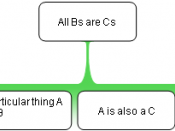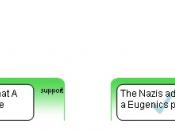Logical "fallacies are defects in an argument - other then false premises -which cause an argument to be invalid, unsound, or weak" (Cline, n.d., para.1). Thepurpose of an argument is to give reasons in support of some conclusion (Downes,1996, para. 1). A fallacy is committed when the reasons offered do not support theconclusion (para. 1). Finding the logical fallacies in an argument is an importanttool of the critical thinker and can help when evaluating arguments proposed byothers. It can also be a useful tool when examining your own arguments. While thereare many fallacies this paper will address only three. The three are Ad Hominem, orAttacking the Person, Hasty Generalization, and Non Sequitur.
Ad Hominem, or Attacking the Person, is when rather then criticizing the pointsof someone's argument, the attacker criticizes the individual. There are many formsof Attacking the Person such as attacking the person's character, circumstances,associations, or pointing out that the person does not practice what they preach.
Attacking a person's character involves the use of negative remarks about theindividual and is the simplest form of Attacking the Person. An attack on a person'scircumstances is when the attacker points out a relationship between the person andthe person's circumstances, such as pointing out that a candidate supports highertaxes for the middle class because they will not be effected, being that they are ina higher tax bracket. An attack on a person's associations, or people they associatewith, is when the attacker points out that the person is associated with a group thatmay have an adverse impact on the person, such as pointing out that a candidatereceives campaign contributions from a special interest group. Pointing out that aperson does not practice what they preach is stating that a person does not do whatthey say for someone else to do. For instance, the attacker...


